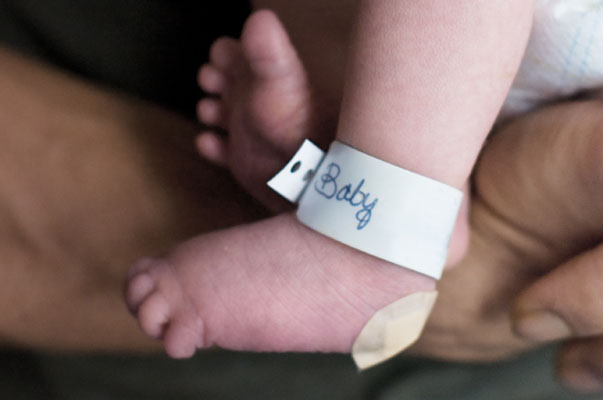The claim
 “Muhammad takes the number one spot for boys’ names in the UK.”
“Muhammad takes the number one spot for boys’ names in the UK.”
babycentre.co.uk, 1 December 2014
The background
The permanently suspicious minds at FactCheck HQ owe babycentre.co.uk an apology.
When the parenting website announced today that Muhammad had topped its list of names for baby boys born in 2014 for the first time, we were sceptical.
After all, the Office for National Statistics (ONS) puts out its own lists of the most popular baby names of the year, and Muhammad is nowhere near the top.
On reflection, we think babycentre’s figures are relatively good. But they don’t mean Britain has suddenly turned into a Muslim country. Here’s why…
The analysis
The website recorded the baby names selected by more than 50,000 people who became parents in 2014. That’s a big sample, much bigger than the ones most pollsters use to predict the outcome of elections.
Here are the top 100 boys’ names and the top 100 for girls, according to babycentre.
Muhammad is number one for boys for the first time. Other Arabic boys’ names like Omar, Ali and Ibrahim are in babycentre’s top 100 for the first time, and the Arabic girls’ names Nur and Maryam have risen in the rankings.
The latest ONS figures are from 2013. They take in most births in England and Wales and the results are actually fairly similar to babycentre’s list for the same year.
Both organisations have Ava, Olivia, Emily, Sophie, Isabella, Oliver Jack, Charlie, Harry, Oscar, Thomas, Jacob, James in their top tens for girls and boys that year.
Muhammad didn’t make it into the official top 10 for 2013, but there is a good reason for that. The ONS count variant transliterations of the Islamic prophet – Muhammad, Mohammed, Mohammad – as separate names, whereas babycentre.co.uk lump count all the different spellings as one name.
If the ONS did the same, Muhammad (and variations) would indeed have been the number one baby boy’s name last year, and it would have been in the top five in every one of the last five years.
So Muhammed hasn’t suddenly arrived from nowhere. It is consistently highly ranked. And there is a simple explanation for this: while the world’s Muslims have many good qualities, being imaginative about boys’ names isn’t one of them.
Professor David Voas, an expert in population studies from the University of Essex, told FactCheck: “The story basically is that 2 per cent of baby boys are now called Mohammed. The reason for that is that there is relatively little variation in Muslim names, as opposed to non-Muslim names.
“A higher proportion of Muslims give their male children the name Muhammad, in one variation or another. For non-Muslims, there is a huge range of everything.”
“Although the proportion of infants who are born into Muslim families is now something like 9 or 10 per cent – a figure that is either high or low depending on how you see these things – a fairly significant proportion of those get given the name Mohammed.”

Does this mean Britain is turning into a Muslim country?
As we found in a previous FactCheck, Britain’s Muslim population has grown rapidly in recent decades. Some 3 per cent of people in England and Wales identified themselves as Muslims in 2001 and by 2011 it was 4.8 per cent, according to the censuses in those years.
And many demographers predict that it will continue to rise, thanks to higher birth rates among immigrants from Muslim countries, and the fact that the British population tends to be younger, with more women of child-bearing age.
But the suggestion that Britain could have a Muslim majority by 2050 is likely to be scaremongering.
It ignores the fact that, while Muslim birth rates tend to be higher in most countries, they also tend to fall over time and approach the same level as the rest of the population in the end.
Professor Voas told us: “Birth rates have been higher amongst immigrants generally, and perhaps Muslims particularly…the Muslim birth rates converge fairly quickly to the national norms.”
His prediction is that the British Muslim community could eventually grow to make up around 10 per cent of the population, but predictions of much higher percentages are “a bit bonkers”.
However, predictions like this depend on forecasts of migration from Muslim countries. Very high net migration could change the demographics.
America’s Pew Research Center has the UK Muslim population hitting 8.2 per cent by 2030, extrapolating from historical net migration.
The last time we FactChecked this topic, readers asked about rates at which non-Muslims are converting to Islam, and how much that is likely to swell the future Muslim population.
The best research we can find on converts is this – a study based on census data, phone calls to mosques and an online survey. It found that there may have been as many as 100,000 Muslim converts living in the UK in 2010, but people were only converting at a rate of about 5,000 a year.




